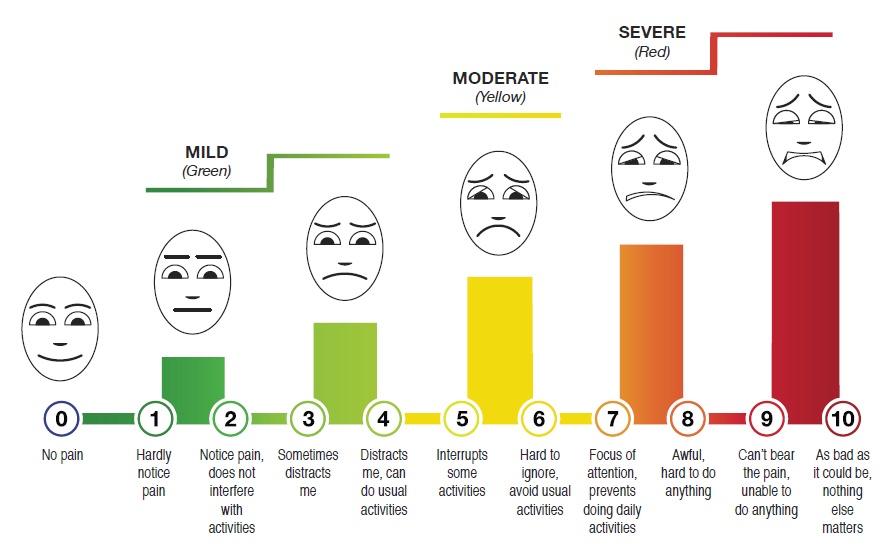Pain is our body's way of telling us that something is wrong.
You may have pain following surgery. This pain should go away after the area operated on has healed. After your surgery, you will be given pain relief as you need it. The most common way to control acute pain is to take pain relieving medicines.
You will be asked to rate your pain when you are resting and moving. Pain is assessed regularly after your surgery.
You will be asked by your nurse or doctor to score how bad your pain is while you are lying still and, more importantly, when you move about or cough. The hospital staff may use a pain scale to help assess the amount of pain you have. You need to give your pain a rating out of 10, which best represents your pain.
You will give a number between 0 (no pain) and 10 (worst possible pain). This describes how much pain you feel in your surgery site or wound. The pictures below will help you rate your pain.

Defense and Veterans Pain Rating Scale
| 0 | No pain | No pain |
| 1 | Mild (Green) | Hardly notice pain |
| 2 | Mild (Green) | Notice pain, does not interfere with activities |
| 3 | Mild (Green) | Sometimes distracts me |
| 4 | Mild (Green) | Distracts me, can do usual activities |
| 5 | Yellow (Moderate) | Interrupts some activities |
| 6 | Yellow (Moderate) | Hard to ignore, avoid usual activities |
| 7 | Severe (Red) | Focus of attention, prevents doing daily activities |
| 8 | Severe (Red) | Awful, hard to do anything |
| 9 | Severe (Red) | Can’t bear the pain, unable to do anything |
| 10 | Severe (Red) | As bad as it could be, nothing else matters |
Permission is granted for clinicians and researchers to freely use the Defense and Veterans Pain Rating Scale (DVPRS) as is, without alteration.
You will be asked to do this regularly to help your nurses and doctors choose the best medicine and dose for you. Although we would like to take away all the pain and discomfort, sometimes pain cannot be removed completely. Our aim is to make you as comfortable as possible. This especially includes when moving around and performing activities.
Do not wait until the pain becomes very bad. If pain is treated early the medicine can make it go away quickly. Tell your nurse when you need pain relief or if you did not get better after taking the medicine.
Is Pain Relief Important?
Yes. As well as making you more comfortable, good pain relief may help in faster recovery, even for those who have major surgery.
Good pain control can help you:
- Be more comfortable after your surgery.
- Get well faster. With less pain, you can start to walk, do your breathing exercises and get your strength back more quickly.
- Improve your results. People whose pain is well controlled do better after surgery with less problems.
Pain can almost always be relieved, and a variety of methods are available.
These include:
- Tablets
- Occasional injections (needles)
- Patient Controlled Analgesia (PCA)-small doses of pain medicine controlled by you via a drip
- Local anaesthetic given near your wound that stops the feeling of pain
- Epidural analgesia given into your back that blocks the pain over your wound
Regular Paracetamol is often the best treatment for mild to moderate pain. For more severe acute pain, stronger medicines are given. Morphine, Fentanyl or Oxycodone are examples. They are also called opioids.
If you have wound pain we may give you anti-inflammatory drugs. By adding 2 or more medicines that work in different ways, smaller amounts of the strong opioid medicine may be needed. You should always ask your doctor what medicine is safest after surgery.
The aim of good pain control is pain relief without unpleasant side effects.
Anaesthetists are doctors who look after your medicine during your surgery. They also specialise in pain relief. The Acute Pain Service is part of the Anaesthetic Department. An Anaesthetist and a nurse may see you at least once a day from the Acute Pain Service as well as the doctors and nurses who provide your regular ward care.Do not wait until any pain becomes very bad. If pain is treated early our medicines can make it go away quickly. Tell your nurse when you need pain relief.
What other people found useful

